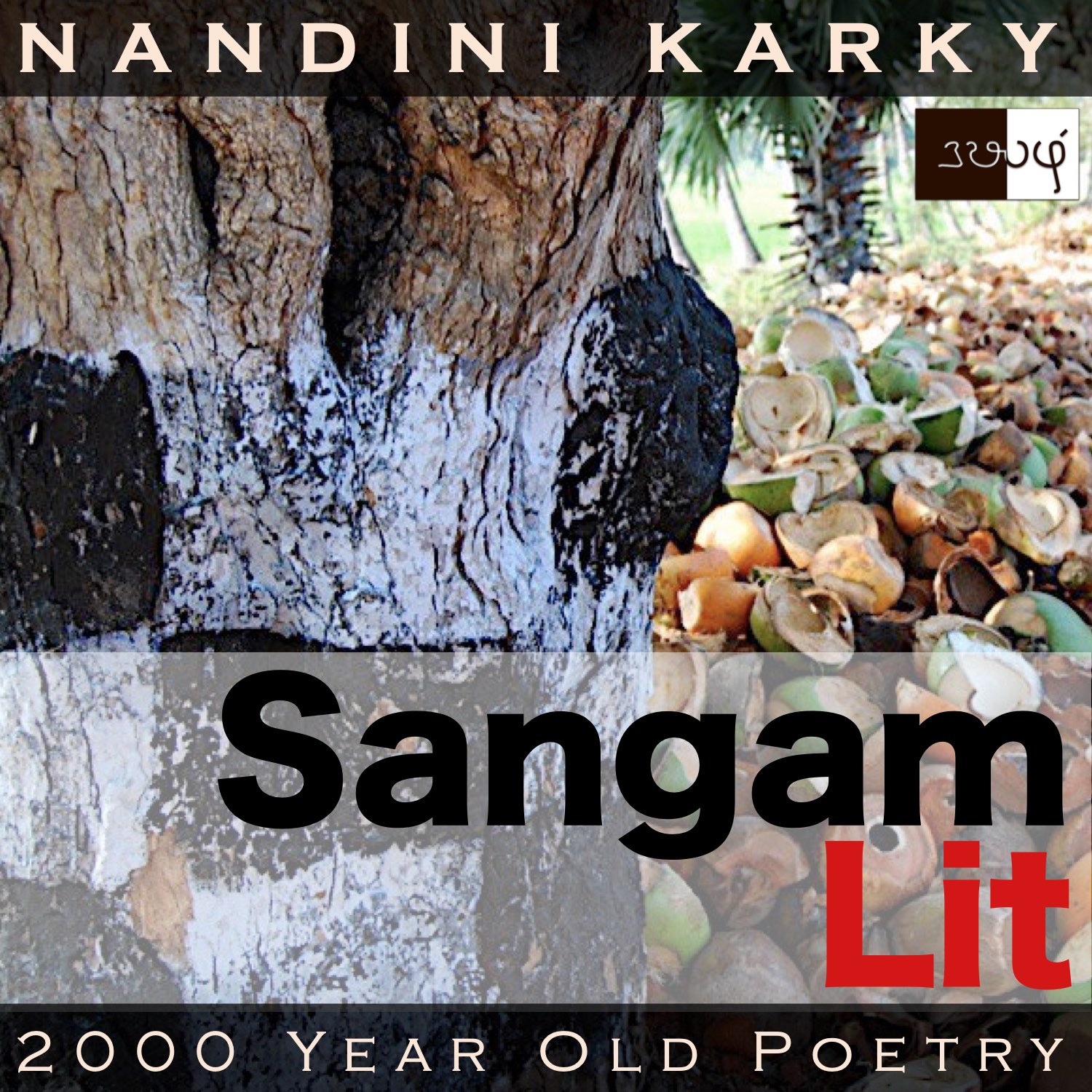Podcast: Play in new window | Download
Subscribe: Apple Podcasts | Spotify | Amazon Music | Android | iHeartRadio | Email | TuneIn | RSS | More

In this episode, we appreciate the abstractions on age and ambition, as portrayed in Sangam Literary work, Natrinai 126, penned by an anonymous poet. Set in the drylands of the ‘Paalai’ landscape, the verse speaks in the voice of a man to his heart, stressing on the futility of undertaking a journey seeking wealth.
பைங் காய் நல் இடம் ஒரீஇய செங்காய்க்
கருங் கனி ஈந்தின் வெண் புறக் களரி
இடு நீறு ஆடிய கடு நடை ஒருத்தல்
ஆள் பெறல் நசைஇ, நாள் சுரம் விலங்கி,
துனைதரும் வம்பலர்க் காணாது, அச் சினம்
பனைக் கான்று ஆறும் பாழ் நாட்டு அத்தம்,
இறந்து செய் பொருளும் இன்பம் தரும் எனின்,
இளமையின் சிறந்த வளமையும் இல்லை;
இளமை கழிந்த பின்றை, வளமை
காமம் தருதலும் இன்றே; அதனால்,
நில்லாப் பொருட் பிணிச் சேறி;
வல்லே நெஞ்சம்!-வாய்க்க நின் வினையே!
The poem opens as if it’s a time-lapse video of a fruit in its many stages for we see ‘பைங் காய்’ meaning ‘green, unripe fruit’, followed by ‘செங்காய்’ meaning ‘red, unripe fruit’ and finally, ‘கருங் கனி’ meaning ‘black fruit’. We understand it’s a ‘palm fruit’ being captured when we meet ‘ஈந்து’ or the ‘palm tree’. ‘களரி’ meaning ‘saline soil’ and ‘பாழ் நாட்டு அத்தம்’ meaning ‘wasteland path’ both render information about the geographical aspects of the ‘Paalai’ or drylands. Not leaving behind the fauna, before our eyes appear ‘ஒருத்தல்’ or ‘a male elephant’. Met a curious word ‘வம்பலர்’ and wondered if it had anything to do with ‘வம்பு’, which has many meanings, the popular of which being ‘teasing or pulling another’s leg’. However, here it appears in the meaning of ‘newness’ and is said to refer to a ‘stranger’ or ‘wayfarer’. Establishing the core theme, appear the words ‘பொருட் பிணி’ meaning ‘affliction of seeking wealth’. Let’s investigate to understand more about this ever-enduring illness.
The man and lady are married and living a happy life together. Circumstances arise such that the man’s heart propels him in the direction of earning wealth. The man then turns to his heart and says, “Leaving behind the tender, green hue of its past, then reaching the fine stage of a red hue, it finally ends up as the black fruit, hanging from the palm trees, which stand on the white, salty surface of the marshland. On this surface filled with wind-swept dust, there strides a fast-gaited elephant intending to strike down a man and waits there at daybreak. Seeing no new wayfarer there, it gives vent to its fury by felling palm trees nearby. Such is the path through the wastelands, where you intend to walk through to seek wealth, thinking that it will bring you joy. There’s no better wealth than youth and when youth is gone, the wealth you earn cannot bring back the pleasures of youth too! Afflicted by the urge to seek this transient wealth, you intend to journey on. O heart, speedily, let your wish bear fruit!” With these words, the man is distancing himself from his heart’s intention to part with the lady and declaring that he will not accompany his heart in its mission to seek wealth.
To understand the underlying facets, we pause and reflect on the images depicted. First, is the capture of the stages as fruit ages. As it changes colour from green to red to black, our attention is focused on the stages of one’s life from childhood to youth to maturity. The innocence of childhood, the stepping into adulthood and finally the greying of maturity is relayed to us subtly through this natural scene. Then, the dangers of the path one travels to seek wealth is highlighted with the mention of a mad elephant seeking a wayfarer to strike and finding none, it fells down a palm tree. The poem seems to be saying just imagine if you were the one caught beneath the elephant’s hefty rage. The man brings forth these images before his heart and then philosophises on youth and wealth. There can be no better prosperity than youth, he says. He adds further that after one ages, all the prosperity that wealth may bring, can never restore the pleasures of youth. He rests his case saying it’s utterly futile to go through all that danger and trouble of seeking something that will not last and even if it were to last, it’s something that cannot bring back what was lost! The man ends his words as if parting from a friend he disagrees with. It’s his own heart that he’s talking to and yet, he bids it bye and wishes it success in its journey!
In this poem, we meet yet again that curious mannerism of treating one’s own heart as if it were another being. The man differentiates himself as the one who wants to stay and the heart as one who wants to leave. Perhaps, this gives him perspective! Indeed, his words reveal that he’s coming from an abstract, philosophical position on the futility of wealth whereas his heart is consumed by the momentary importance of earning it. To me, the poem seems to say that one needs to distance oneself from the impulses and thoughts that arise within, and to see our own motivations as if they were spoken by another. Perhaps, then we can solve the many confusions of the mind with compassion!




Share your thoughts...